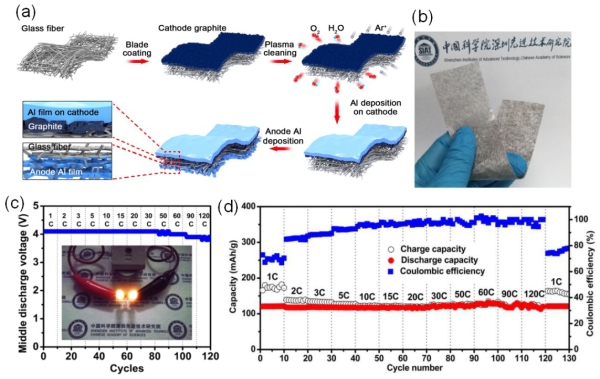Novel Integrated Configuration Design for Flexible and ultrafast Rechargeable Dual-ion Battery
Date:19-07-2017 | 【Print】 【close】
Recently, a research team led by Prof. Yongbing Tang at Functional Thin Film Research Center, Shenzhen Institutes of Advanced Technology, Chinese Academy of Sciences, has developed an integrated configuration design for flexible and ultrafast rechargeable dual-ion battery. This novel cell configuration enhanced the rate capability significantly while maintaining high energy density and cycling performance.
The research “Integrated Configuration Design for Ultrafast Rechargeable Dual-Ion Battery” have been published online in Advanced Energy Materials (DOI: 10.1002/aenm.201700913) and applied for an international invention patent.
Energy density and charge-discharge rate performance are the two KPIs (Key Performance Indicators) for Lithium-ion batteries. It still remains a challenge to improve the rate performance effectively while maintaining the high energy density. Moreover, the fast growing of fields like UAVs (Unmanned Aerial Vehicles), electric tools, EVs (Electric Vehicles), intelligent medical equipment, robots and so on, are promotes the increasing demand for batteries with fast charge-discharge performance.
According to their design concept, the cathode/anode active materials and the positive/negative current collectors are creatively integrated into a porous separator, breaking through the conventional battery structure, then the innovative integrated flexible dual-ion battery with ultrafast charge-discharge performance was developed successfully. This novel design simplifies the fabrication process, and improved the charge-discharge performance significantly. The enhancement of rate performance was achieved by cooperative effect of two aspects. First, the interfacial contact area between the active materials and electrolyte was increased greatly, which reduced the transport resistance of electrons and ions. Second, the integrated interfacial contact of active materials and current collector further enhanced the transport efficiency of electrons.
The research results showed an ultrahigh rate capability up to 120 C (charging/discharging time within 30 s) with ultrahigh power density of 22634 W/kg while maintaining high energy density of 232 Wh/kg. This work is expected to be used in fields like flexible wearable electronics, UAVs, robots and so on. Notably, the integrated design also shows general applicability to improve the rate performance of other power storage devices.
Based on the considerations above, a novel integrated flexible battery configuration design was proposed by Prof. TANG Yongbing and his team members Dr. JIANG Chunlei and FANG Yue. According to their design concept, the cathode/anode active materials and the positive/negative current collectors are creatively integrated into a porous separator, breaking through the conventional battery structure, then the innovative integrated flexible dual-ion battery with ultrafast charge-discharge performance was developed successfully.
This novel design simplifies the fabrication process, and improved the charge-discharge performance significantly.
The enhancement of rate performance was achieved by cooperative effect of two aspects. First, the interfacial contact area between the active materials and electrolyte was increased greatly, which reduced the transport resistance of electrons and ions. Second, the integrated interfacial contact of active materials and current collector further enhanced the transport efficiency of electrons.
The research results showed an ultrahigh rate capability up to 120 C (charging/discharging time within 30 s) with ultrahigh power density of 22634 W/kg while maintaining high energy density of 232 Wh/kg. This results are expected to be used in fields like flexible wearable electronics, UAVs, robots and so on. Notably, the integrated design also shows general applicability to improve the rate performance of other power storage devices.

Figure (a) Schematic illustration of the preparation process of the integrated dual-ion battery, (b) photograph of the as-fabricated integrated flexible dual-ion battery, (c) the middle discharge voltages of the integrated dual-ion battery (DIB) at different current rates ranging from 1 to 120 C, and (d) Rate capacities and corresponding Coulombic efficiency of the integrated DIB at current rates ranging from 1 to 120 C.
Contact: Prof. TANG Yongbing
Editor: ZHANG Xiaomin
